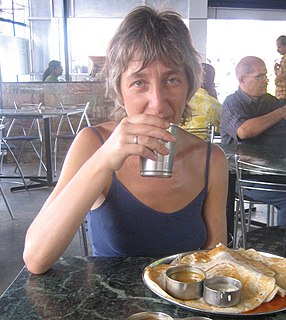Related Research Articles

Jacques Marie Émile Lacan was a French psychoanalyst and psychiatrist who has been called "the most controversial psycho-analyst since Freud". Giving yearly seminars in Paris from 1953 to 1981, Lacan’s work has marked the French and international intellectual landscape, having made a significant impact on continental philosophy and cultural theory in areas such as post-structuralism, critical theory, feminist theory and film theory as well as on psychoanalysis itself.
Psychoanalysis is a set of theories and therapeutic techniques that deal in part with the unconscious mind, and which together form a method of treatment for mental disorders. The discipline was established in the early 1890s by Austrian neurologist Sigmund Freud, who developed the practice from his theoretical model of personality organization and development, psychoanalytic theory. Freud's work stems partly from the clinical work of Josef Breuer and others. Psychoanalysis was later developed in different directions, mostly by students of Freud, such as Alfred Adler and his collaborator, Carl Gustav Jung, as well as by neo-Freudian thinkers, such as Erich Fromm, Karen Horney, and Harry Stack Sullivan.

Sigmund Freud was an Austrian neurologist and the founder of psychoanalysis, a clinical method for evaluating and treating pathologies in the psyche through dialogue between a patient and a psychoanalyst.
Psychoanalytic literary criticism is literary criticism or literary theory which, in method, concept, or form, is influenced by the tradition of psychoanalysis begun by Sigmund Freud.
Psychoanalytic theory is the theory of personality organization and the dynamics of personality development that guides psychoanalysis, a clinical method for treating psychopathology. First laid out by Sigmund Freud in the late 19th century, psychoanalytic theory has undergone many refinements since his work. The psychoanalytic theory came to full prominence in the last third of the twentieth century as part of the flow of critical discourse regarding psychological treatments after the 1960s, long after Freud's death in 1939. Freud had ceased his analysis of the brain and his physiological studies and shifted his focus to the study of the mind and the related psychological attributes making up the mind, and on treatment using free association and the phenomena of transference. His study emphasized the recognition of childhood events that could influence the mental functioning of adults. His examination of the genetic and then the developmental aspects gave the psychoanalytic theory its characteristics. Starting with his publication of The Interpretation of Dreams in 1899, his theories began to gain prominence.

The mirror stage is a concept in the psychoanalytic theory of Jacques Lacan. The mirror stage is based on the belief that infants recognize themselves in a mirror (literal) or other symbolic contraption which induces apperception from the age of about six months.
Nancy Julia Chodorow is an American sociologist and professor. She can be categorized as a Humanistic psychoanalytic sociologist and Psychoanalytic feminist. Throughout her career, she has been influenced by psychoanalysts Sigmund Freud and Karen Horney, as well as feminist theorists Beatrice Whiting and Phillip Slater. She is a member of the International Psychoanalytical Association, and is a frequent speaker at their congress meetings. She began her career as a professor of Women's studies at Wellesley College in 1973. In 1974, she moved California where she taught at the University of California, Santa Cruz until 1986. She then went on to spend many years as a professor in the departments of sociology and clinical psychology at the University of California, Berkeley until she resigned in 1986. Later, she began her career teaching psychiatry at Harvard Medical School/Cambridge Health Alliance. Chodorow is often described as a leader in feminist thought, especially in the realms of psychoanalysis and psychology.
Depth psychology refers to the practice and research of the science of the unconscious, covering both psychoanalysis and psychology. It is also defined as the psychological theory that explores the relationship between the conscious and the unconscious, as well as the patterns and dynamics of motivation and the mind. The theories of Sigmund Freud, Carl Gustav Jung, and Alfred Adler are all considered its foundations.

The Symbolic, linked by the sinthome to the Imaginary and the Real, is a part of Lacanianism: the psychoanalytic theory of Jacques Lacan.

Freudo-Marxism is a loose designation for philosophical perspectives informed by both the Marxist philosophy of Karl Marx and the psychoanalytic theory of Sigmund Freud. It has a rich history within continental philosophy, beginning in the 1920s and 1930s and running since through critical theory, Lacanian psychoanalysis, and post-structuralism.
Ian Parker is a British psychologist and psychoanalyst. He is Emeritus Professor of Management in the School of Business at the University of Leicester.
The Discourse Unit is an international research group that currently has its main base at the University of Manchester in the United Kingdom. It has been one of the most important focal points for the development of critical work in psychology and in other social sciences concerned with questions of subjectivity and politics. The term "discourse" is used as a cover-all term for political studies of individual subjectivity that draw on feminism, Marxism, post-structuralism and psychoanalysis. In 2003, Ian Parker produced a document for the Discourse Unit that outlines the way that researchers in the group draw on these four theoretical resources. There is disagreement within the research group over the accuracy of this document.

Erica Burman is a critical development psychologist based in the United Kingdom. While little known in the developmental psychology research community, her work has been a conceptual resource for critiques of the field, notably feminist perspectives on the connections between different forms of oppression, and methodological debates in psychology.

The Oedipus complex is a concept of psychoanalytic theory. Sigmund Freud introduced the concept in his book Interpretation of Dreams (1899) and coined the expression in his paper A Special Type of Choice of Object made by Men (1910). In Freud's original formulation, the Oedipus complex is a purportedly universal phase in the life of a young boy in which he hates his father and wishes to have sex with his mother. These wishes may be unconscious.
Psychoanalytic sociology is the research field that analyzes society using the same methods that psychoanalysis applied to analyze an individual.
Kelly Oliver is an American philosopher specializing in feminism, political philosophy and ethics. She is W. Alton Jones Professor of Philosophy at Vanderbilt University in Nashville, Tennessee. She is also a founder of the feminist philosophy journal philoSOPHIA.
Wolfgang Giegerich is a German psychologist, trained as a Jungian analyst. He was a practicing clinician for many years and has published books and articles on depth psychology since the mid-1970s.
Poststructural feminism is a branch of feminism that engages with insights from post-structuralist thought. Poststructural feminism emphasizes "the contingent and discursive nature of all identities", and in particular the social construction of gendered subjectivities. A contribution of this branch was to argue that there is no universal single category of "woman" or "man."

Freud and Philosophy: An Essay on Interpretation is a 1965 book about Sigmund Freud, the founder of psychoanalysis, written by the French philosopher Paul Ricœur. In Freud and Philosophy, Ricœur interprets Freud's work in terms of hermeneutics, the theory of the rules that govern the interpretation of a particular text, and discusses phenomenology, a school of philosophy founded by Edmund Husserl. He addresses questions such as the nature of interpretation in psychoanalysis, the understanding of human nature and the relationship between Freud's interpretation of culture and other interpretations. The book was first published in France by Éditions du Seuil, and in the United States by Yale University Press.
Lacanianism or Lacanian psychoanalysis is a theoretical system that explains the mind, behaviour, and culture through a structuralist and post-structuralist extension of classical psychoanalysis, initiated by the work of Jacques Lacan from the 1950s to the 1980s. Lacanian perspectives contend that the world of language, the Symbolic, structures the human mind, and stress the importance of desire, which is conceived of as endless and impossible to satisfy. Contemporary Lacanianism is characterised by a broad range of thought and extensive debate between Lacanians.
References
- ↑ Parker, I (1997). Psychoanalytic Culture: Psychoanalytic Discourse in Western Society. London: Sage.
- ↑ Blackwell, D. (1996) 'Power and Heroism in Academia and the Movies: Discussion on Paper by Ian Parker II', Group Analysis, 29, pp. 114-119.
- ↑ Hinshelwood, R. D. (1996) '“Minus K” or “Minus L”? Discussion on Paper by Ian Parker I', Group Analysis, 29, pp. 111-114.
- ↑ Hurme H (1995). "Wild man or golden bird: cultural readings of masculinity". Culture and Psychology. 1: 477–486.
- ↑ Parker, I (2002). Critical Discursive Psychology. London: Palgrave.
- ↑ Burman, E (1994). Deconstructing Developmental Psychology. London: Routledge.
- ↑ Parker I in D Hook, ed. (2004). "Psychoanalysis and critical psychology". Critical Psychology. Cape Town: UCT Press.